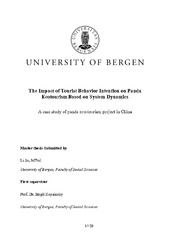| dc.description.abstract | In recent years, tourism is becoming more and more popular, government has put forward an ecological tourism on giant pandas in Sichuan Province, aiming at promoting local tourism and promoting economic development. At the same time, ecological tourism has certain educational significance, especially for giant pandas, a kind of endangered animal. Developing eco-tourism, more people can get a deeper understanding of the living status and current environment of giant pandas, thus appealing to more people to participate in the protection of giant pandas over a long period of time. However, there are some doubts about the project of vigorously developing panda ecotourism. The expansion of tourist reception sites will cut down forests and turn more forest land into roads, reception sites and scenic spots, which seriously affects the living space of wildlife and makes the habitat of giant pandas smaller and smaller. Moreover, for domestic short-distance travel, the public prefers to choose private cars or tourist buses. The emission of automobile exhaust will also pollute the local air, thus indirectly affecting the life span of giant pandas. The factors mentioned above are all related to the tourists behavioral intention on this project. Under this circumstance, this paper takes system dynamics as the main research method, adopts some data collection methods, establishes the basic data and makes a concrete research through the concept of behavioral intention. A series of solutions, replacing with new energy vehicles and planting more trees to return farmland to forest, are also put forward and evaluated the effect of the implementation of the scheme. After the implementation of the policy, it indicates that the number of giant pandas increases, the capacity of tourism reception increases and tourism income increases correspondingly. The urgent problem of sustainable development of ecological tourism of giant pandas has been solved. In the end of this article, some limitations and restrictions of implementation are also put forward together with some considerations of stakeholders. | en_US |
